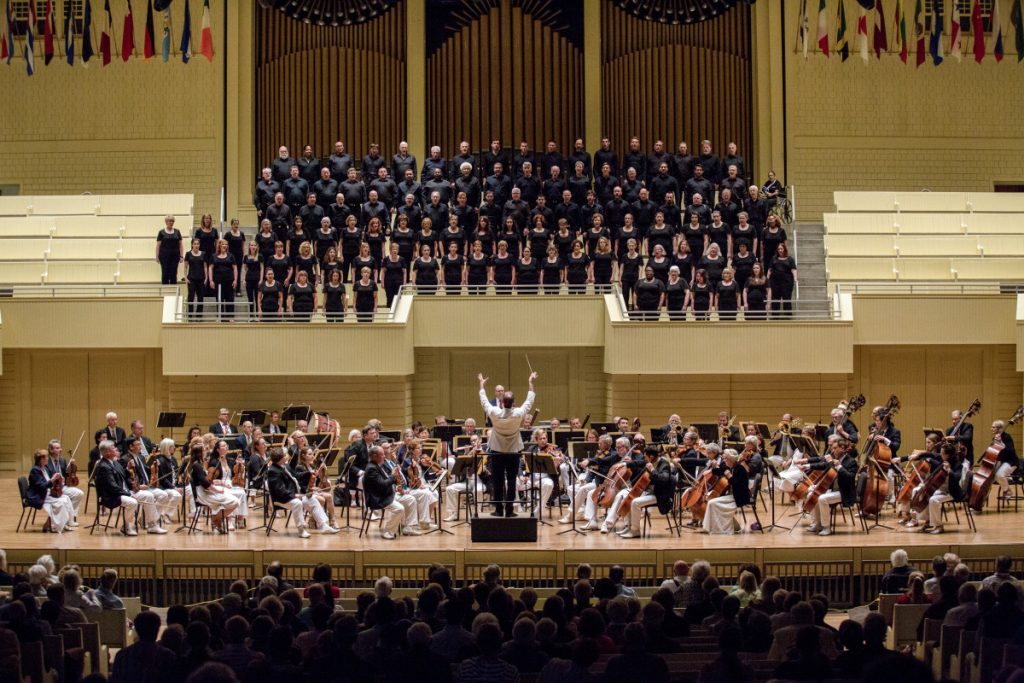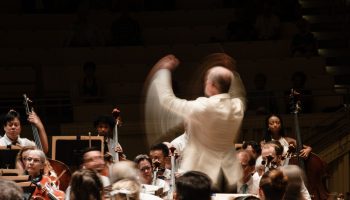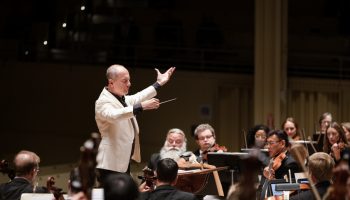
Rossen Milanov conducts the Chautauqua Symphony Orchestra in Beethoven’s Ninth Symphony on July 1, 2017.
In a year celebrating not just Chautauqua Institution’s sesquicentennial, but the 200th anniversary of Beethoven’s Symphony No. 9, it’s only fitting to showcase the composer’s most beloved, enduring work on the Institution’s biggest stage.
At 8:15 p.m. Saturday evening in the Amphitheater, the Chautauqua Symphony Orchestra, under the baton of Principal Symphonic Conductor and Music Director Rossen Milanov, will be joined by the Buffalo Philharmonic Chorus and music director Adam Luebke for Beethoven’s “Ode to Joy,” offering a sense of hope and unity in a moment of political division.
“Our community is well aware of the divisiveness in the country right now and this (performance) is an invitation into joy,” said Senior Vice President and Chief Program Officer Deborah Sunya Moore. “This is uniquely special at Chautauqua; we can be in the Amphitheater and experience this together, knowing that about 2,000 other people share that experience with us —regardless of position or belief.”
In composing this symphony, his longest and his last, Beethoven was inspired by Friedrich Schiller’s poem “Ode to Joy.” At the heart of that poem are themes of freedom, unity, and justice.
Informed by the composer’s idealism, Symphony No. 9 is an innovation of its time. This was the first time a famous composer used voices in a symphony, as well as the first time for “Turkish” instruments — triangle, cymbals, and bass drum.
David B. Levy is a musicologist whose field of expertise is Beethoven’s Ninth. He’s written a book on the topic, taught a Special Studies course in Week One on the piece, and in May led a Chautauqua Travels trip to Vienna as part of the worldwide celebration of the Ninth’s 200th anniversary.
Levy challenges listeners to listen with depth, to not “cherry-pick” text from the poem for a cheap thrill. While composing, Beethoven chose to include those being “othered” at the time; the “Turkish March,” alla turca, includes the verse “Be embraced, Millions! This kiss to all the world!”
“(Don’t) just recognize the beauty and art — there’s a morality lesson,” Levy said.
But before “Ode to Joy,” Saturday’s program opens with Howard Hanson’s “Song of Democracy” joining the Beethoven in a celebration of collective, connected humanity.
Hanson composed the “Song of Democracy” in 1957, based on a text by Walt Whitman; Hanson’s musical Romanticism and Whitman’s optimism hold close the idea of inclusive democracy, based on equal respect and dignity for all individuals. The entirety of Hanson’s work reflects a deeply held conviction in spirit.
Luebke, music director of the Buffalo Philharmonic Chorus, has experience with both pieces on Saturday’s program. He’s performed Beethoven’s Ninth four times before, and said both works continue to be relevant. To Luebke, Beethoven’s Ninth — “the greatest symphony ever written” — is both consistently fresh and known “inside and out.”
“(The Ninth) is so frequently performed and beloved, there’s a life to it that endures; the universality of Schiller’s text and the nature of the melody is uplifting,” Luebke said. “This is a testament to the greatness of the music; it continues to be relevant and finds a way to inspire based on its musical construction and the way it uplifts the text.”
Coming together through music, and to make music, reminds Luebke that “you’re doing something you couldn’t do on your own, you need everybody else to be a part of the music. Even for individuals singing the same, everybody’s voice is different and it adds to the overall sound.”
“Celebrating that we can be together is an important piece of history, especially as it endures today,” Luebke said. “(These values) will always continue to be important to share and give voice to; that’s a privilege our singers get to be a part of.”
Chautauqua’s sesquicentennial celebration programming is not only multidisciplinary, but multigenerational. Moore loves seeing families with young people at the CSO’s concerts, and said that with no intermission, Saturday’s performance would be a great concert to bring kids to.
“When children engage in music, there’s a discipline that’s taught through music,” she said. “But I also think that music becomes a language with which we can express ourselves, even if you aren’t the person making music yourself, the feeling you get allows us to feel more deeply, and ultimately be more human.”
In his work, Levy has analyzed Beethoven’s Ninth in great detail, focusing on the cultural and musical meanings — but he feels an emotional attachment as well.
“Only the most cynical of listeners can walk away from a performance of the Ninth Symphony without sensing that all could be well with the world, if only the world wished it so,” he said.




